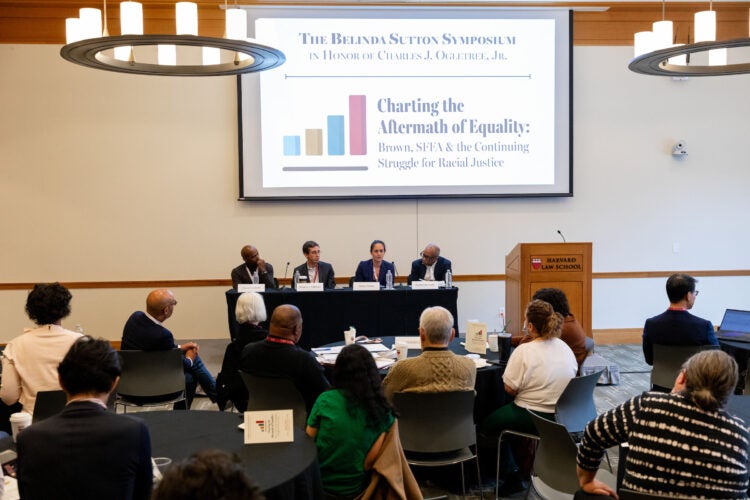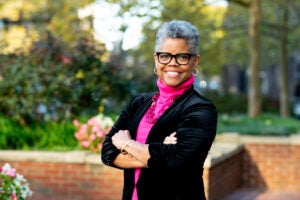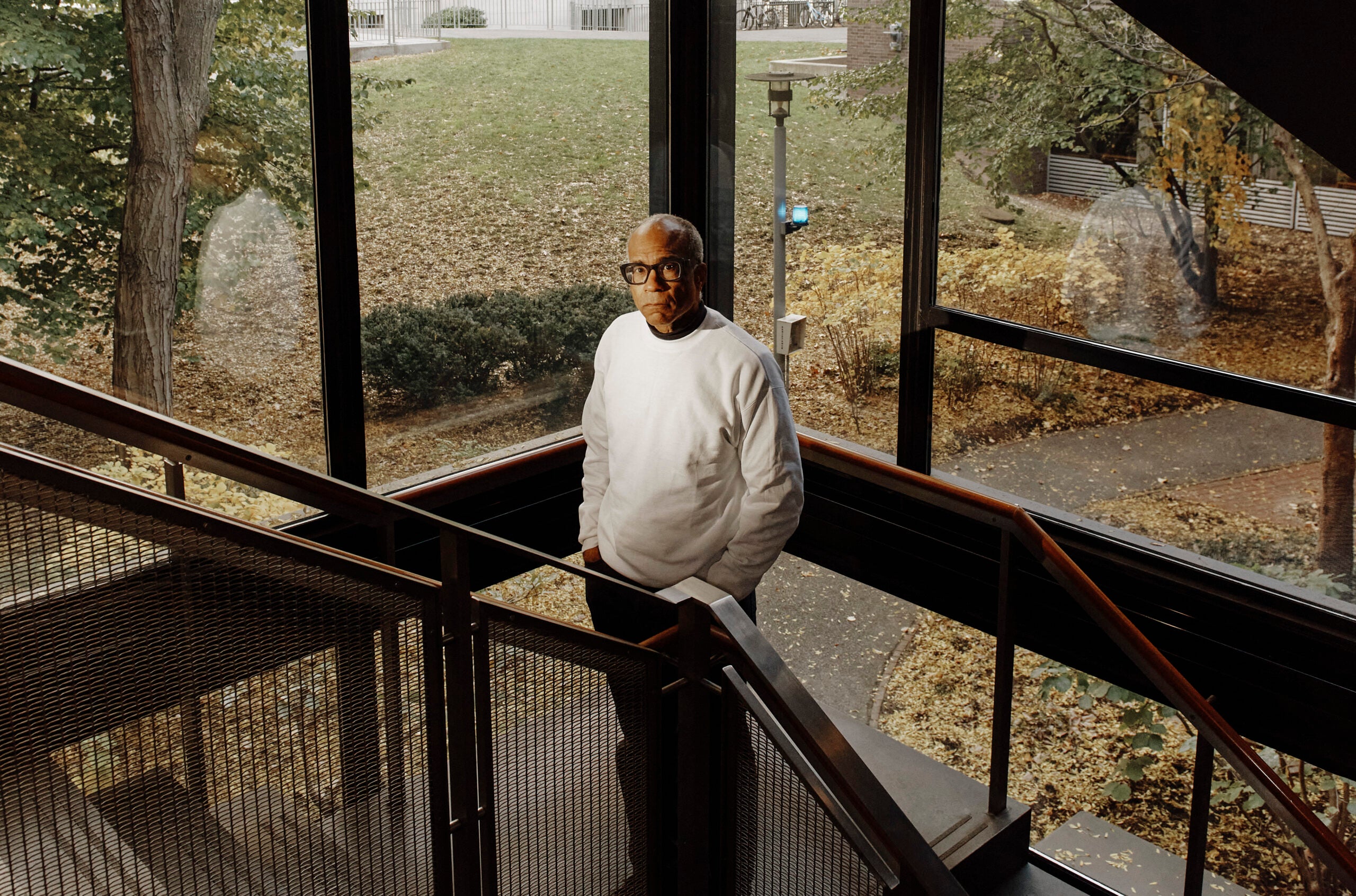People
Randall Kennedy
-
Opening conversation on more, better discourse
January 23, 2024
The growing need for more and better discourse on difficult topics at Harvard as well as at college campuses across the nation prompted a two-day…
-
Justice for All
December 20, 2023
After serving as a law professor and dean, Verna Williams ’88 now advocates for public service and seeks to expand legal representation
-
U.S.-Iran prisoner exchange; American cyclist Sepp Kuss wins Vuelta A España
September 19, 2023
Five Americans have been released from prison in Iran. In exchange, the U.S. released five Iranian prisoners and gave Iran access to $6 billion in…
-
In a historic decision, the U.S. Supreme Court on Thursday effectively ended race-conscious admission programs at colleges and universities across the country. In a decision…
-
An op-ed by Randall Kennedy: As we await a Supreme Court ruling that is likely to restrict, if not prohibit, crediting racial identity as a…
-
When Clarence Thomas was accepted to Yale Law School in 1971, the school’s stated goal was for students of color like him to make up…
-
Five days before Michael Kirk’s documentary about the love and lives of Clarence and Ginni Thomas was set to air on PBS, ProPublica dropped another…
-
‘In pursuit of an atmosphere in which ideas can be followed without fear that you’ll be punished’
December 6, 2022
Professors Jeannie Suk Gersen and Janet Halley lead the Academic Freedom Alliance, an organization that protects the rights of faculty to speak or publish without fear of sanction or punishment.
-
A Visit to the Banned-Book Bus With a Scholar Who Helped Develop Critical Race Theory
October 31, 2022
The buses are hard to miss. One is unusually elegant for a bus—deep, shiny black with deeper black windows and a cognac leather interior. One…
-
Rebroadcast: Scholar Randall Kennedy’s reflections on race, culture and law in America
September 6, 2022
For decades, scholar Randall Kennedy has been writing about race, culture and the law. “We are certainly much further from the racial promised land than…
-
Worried about democracy? Pay attention to the states
March 28, 2022
Washington obsesses over how many Republicans will vote for the eminently qualified Supreme Court nominee Ketanji Brown Jackson, or Joe Manchin's (D-W.Va.) latest attention-getting move, or the forever tribulations of Vice President Kamala Harris. There's a lot more real action out in the states, at least in the red states. They are shredding rights for voting, minorities, women, gays and people with disabilities. ... “This is political demagoguery,” says Harvard Law School professor Randall Kennedy, an expert on the subject. It's used mainly, he told me, by right-wingers to “smear any liberal who advances a progressive race agenda.” There are, he adds, critical race theorists who “spout implausible and sometimes downright ugly theories,” which serve to give “oxygen to the right-wing campaign of repression.”
-
A critic of critical race theory says the campaign against CRT is “abhorrent and dangerous and deeply disturbing”
March 14, 2022
Randall Kennedy is a Harvard law professor and author. He recently talked with Nathan J. Robinson, editor of Current Affairs, about his new book Say It Out Loud : On Race, Law, History, and Culture. Here is a taste of their exchange
-
Randall Kennedy on Why Critical Race Theory is Important
March 3, 2022
Professor Randall Kennedy of Harvard Law School is the author of a number of books, including For Discrimination: Race, Affirmative Action, and the Law, The Persistence of the Color Line: Racial Politics and the Obama Presidency, Sellout: The Politics of Racial Betrayal, and, most recently, Say it Loud!: On Race, Law, History and Culture. Kennedy recently came on the Current Affairs podcast to talk with editor in chief Nathan J. Robinson. This interview has been lightly edited for grammar and clarity.
-
Harvard Law School professor Randall Kennedy has been known for decades as a critic of Critical Race Theory, which was developed in part by his late colleague Derrick Bell. But Kennedy's critiques come from a position of intellectual respect, and over the years he has become more sympathetic to some of the central claims CRT makes about the pervasive and intractable nature of American racism. His new book Say It Loud! On Race, Law, History, and Culture collects his essays from the past several decades, many of which deal with the question of how American racism has functioned historically, how it has morphed over time, and what a rational way to think about it is.
-
This is the rundown for Radio Boston for February 23. Tiziana Dearing is our host. Curry College in Milton, MA is going remote for the rest of the week after swastikas and threatening messages targeting Black students were found on campus. This has become a fairly common occurrence at schools and universities. We speak with State Senator Barry Finegold and Sarah Granoff, VP of Simmons University Hillel, about how to talk about anti-Semitism with young people. Harvard Law Professor and author Randall Kennedy joins us to talk about the twentieth anniversary re-release of his book, which examines our nation's most abhorred racial slur, chronicling the word's history, the law and litigation around it and its cultural relevance.
-
San Diego teacher Amy Glancy thought she’d prepared her fourth-grade students for the day’s language arts lesson. She knew there was a land mine in the poem she planned to read, but she considered it essential to what she was trying to teach. The reading Glancy chose was Countee Cullen’s iconic Harlem Renaissance poem “Incident,” which poignantly renders a Black child’s painful encounter with racism, when a white boy calls him the N-word. ... I wanted to understand that, so I called Harvard Law professor Randall Kennedy, whose 2002 book, “Nigger: The Strange Career of a Troublesome Word” examines the word’s endurance and the shifting boundaries on its use.
-
‘N-Word’ Should Not Be Banned, Harvard Law Professor Argues
February 7, 2022
Racial tensions and injustices across the U.S. and the globe are unfortunately nothing new, neither are the responses they can elicit. For Randall Kennedy, Harvard scholar and law professor, this has long been a concern. For the majority of his life he has been studying and writing about U.S. law and order, culture, and race. On February 8, the 20th Anniversary edition of his book N-word: The Strange Career Of A Troublesome Word will hit the bookshelves loaded with a new introduction, where Kennedy stands by his original rejection of the eradication and excessive censorship of the n-word, claiming the word is here to stay "for good and for bad."




